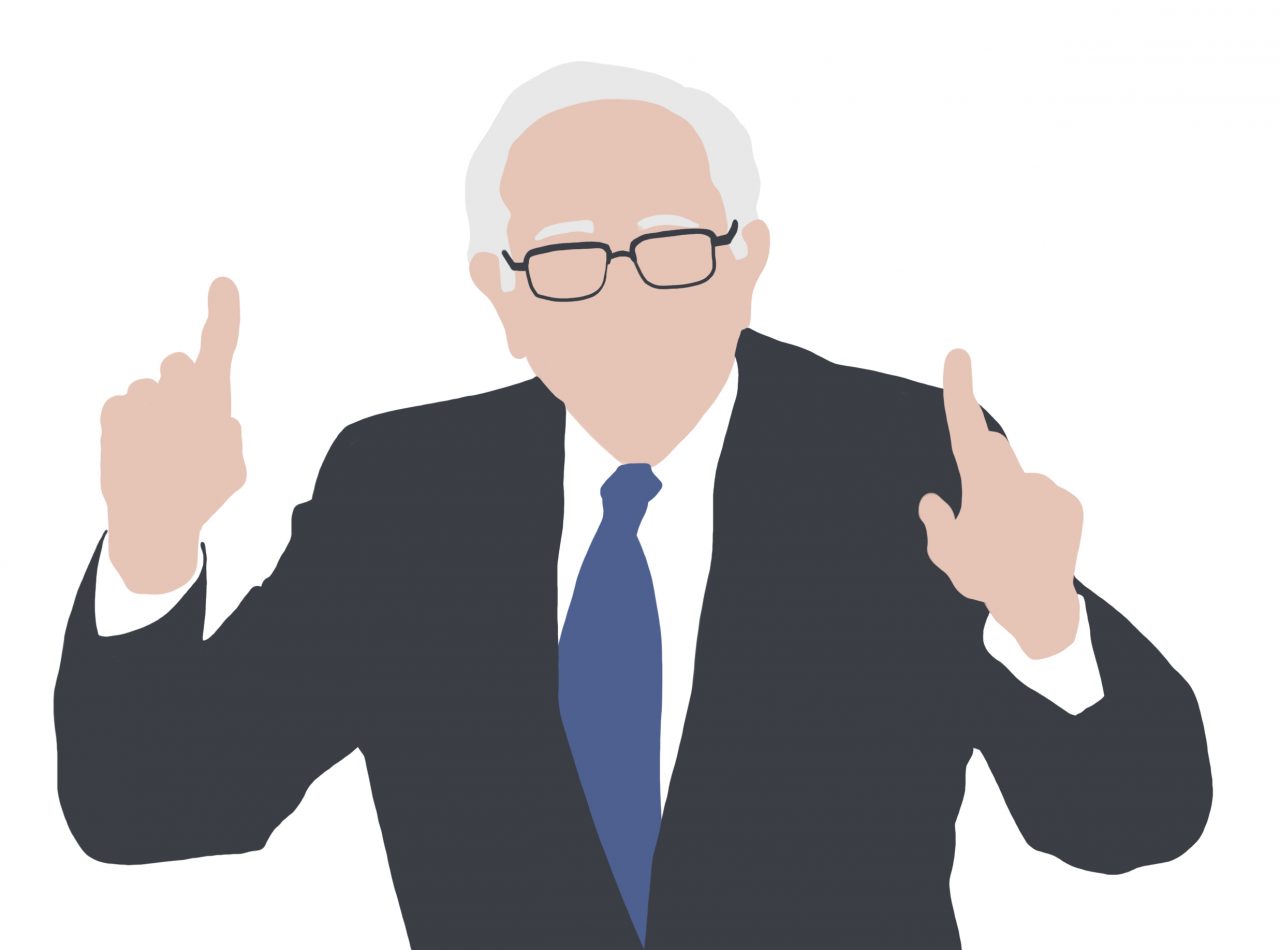Illustration by Andrea Nebhut
After reading last week’s article “Why we should beware the ‘Bern,” I felt the need to give Senator Sanders a defense. While I disagreed with most of what Falcon claimed in the column (points I am happy to discuss at another time), three things stood out to me as problematic or just plain false. In order, it was the (mis)use of the term “ideology,” the coveting of the notion of “unity” and the insistence on “pragmatism” which led me to write this article.
Ideology
Falcon uses the term “ideology” twice in his article: first in claiming he has no beef with Senator Sanders’s ideology, only his actions, and second in stating that Trump and Sanders are mirror images of each other, differing only in ideology. I would first like to clear up the definition of ideology, as it has become something of a buzzword for aspiring political junkies. In general, ideology refers both to how you think the world should work, as well as how it works in reality.
The problem in the argument comes when Falcon asserts a false dichotomy between what someone thinks and how they carry out their belief(s). This implies that thought and action are mutually exclusive, which is false. Thought determines action. Trump would not lock kids in cages if he did not believe that they were somehow inferior or exploitable. Likewise, Bernie would not spend his life fighting for Medicare For All if he did not believe that healthcare was a human right. The line between ideology and instrumentality is very hazily defined and, for the most part, useless.
Even if it were correct to state that Trump and Sanders are instrumentally identical, this still would not make them equals. A tool can be used for drastically different ends, and that does not make the ends the same. For instance, shooting someone in self-defense is radically different from committing murder, even though both activities use a firearm.
Unity
Next, I would like to critique Falcon’s fetishization of “party unity.” By the tone and context clues of his article, it is clear that Falcon thinks that “defeating Trump” is the sole mission of the 2020 election, a goal only possible by electing a political “moderate” (more on that term later) and reinstating the pre-2016 status quo. This view is fundamentally flawed in a few ways. First, it presupposes that it is even possible to return to a pre-2016 reality, and second, it presupposes that we would even want to.
It may seem crazy to suggest that someone would not want to undo the damage Trump has done in his part term, but the fact of the matter is that it wasn’t all sunshine and roses before Trump was elected, either. Under the Obama administration, the United States was still committing war crimes overseas and lying about it to the public, average hourly wages in the U.S. still hadn’t moved since 1964, the average worker to C.E.O. pay gap was still over 1:200, and the #MeToo movement still had not occurred. If there is one saving grace to these past four years (and for my own sanity I chose to believe there is), it is that some of these issues have come to light and dialogues have begun to occur, with people finally engaging with these issues instead of staying silent.
Think about all the times in American history when there was a perceived consensus on any social issue. Marriage equality, women’s rights, integration. Each time there was an official consensus on these issues, there was a group of people who were not allowed to join the conversation. What a nostalgia for a pre-2016 America and calls for “unity” do is say that these issues fundamentally do not matter, that if we shut up and get Trump out of office then everything will be better. Guess what: it won’t. Any time there is a perceived consensus on any issue, there is a group of people not having their opinions heard. The essence of democracy is argument, and argument is an indicator that people have become enfranchised enough to be capable of arguing back.
Pragmatism
My last nitpick is Falcon’s use of the term pragmatic. First, any person who claims to be a pragmatist yet still endorses Amy Klobuchar, a candidate who has never polled over 5 percent, is just fooling themselves. Beyond that, however, is the belief that a vote for Sanders is somehow unpragmatic. While it will be difficult for Bernie to enact his desired policies, to say that his policies are unpragmatic is foolish, given that most of them have been enacted in most first world countries. To say that it would be more pragmatic, then, to vote for a “moderate” candidate like Biden or Klobuchar is to say that these policies are somehow impossible to achieve in the U.S., or worse, that the people who these policies would benefit do not deserve to have their effects enacted. A vote for a “moderate” candidate is in fact a vote against your own personal interests. And in a democracy, if you do not vote for what is in your own best interest, who will?






